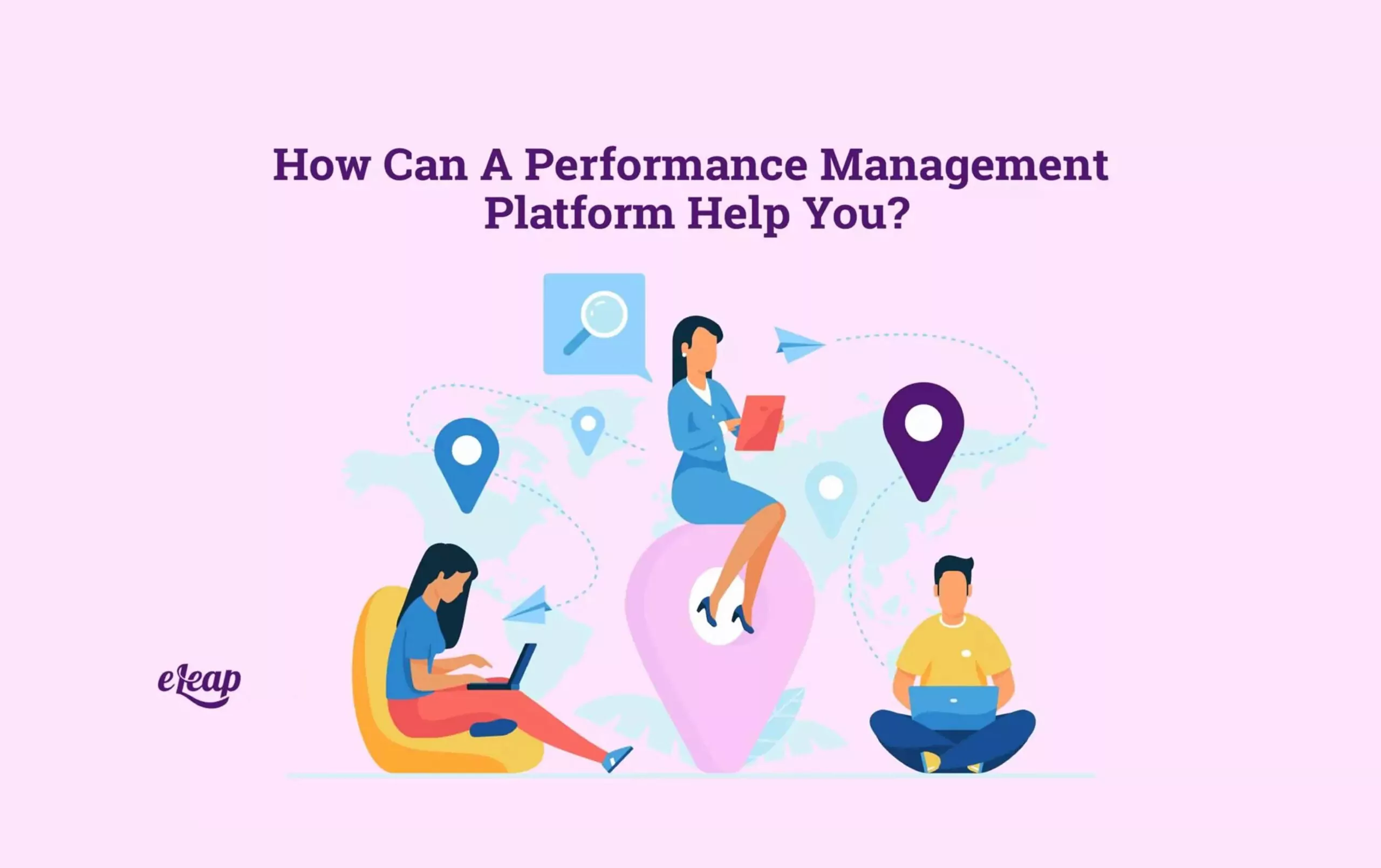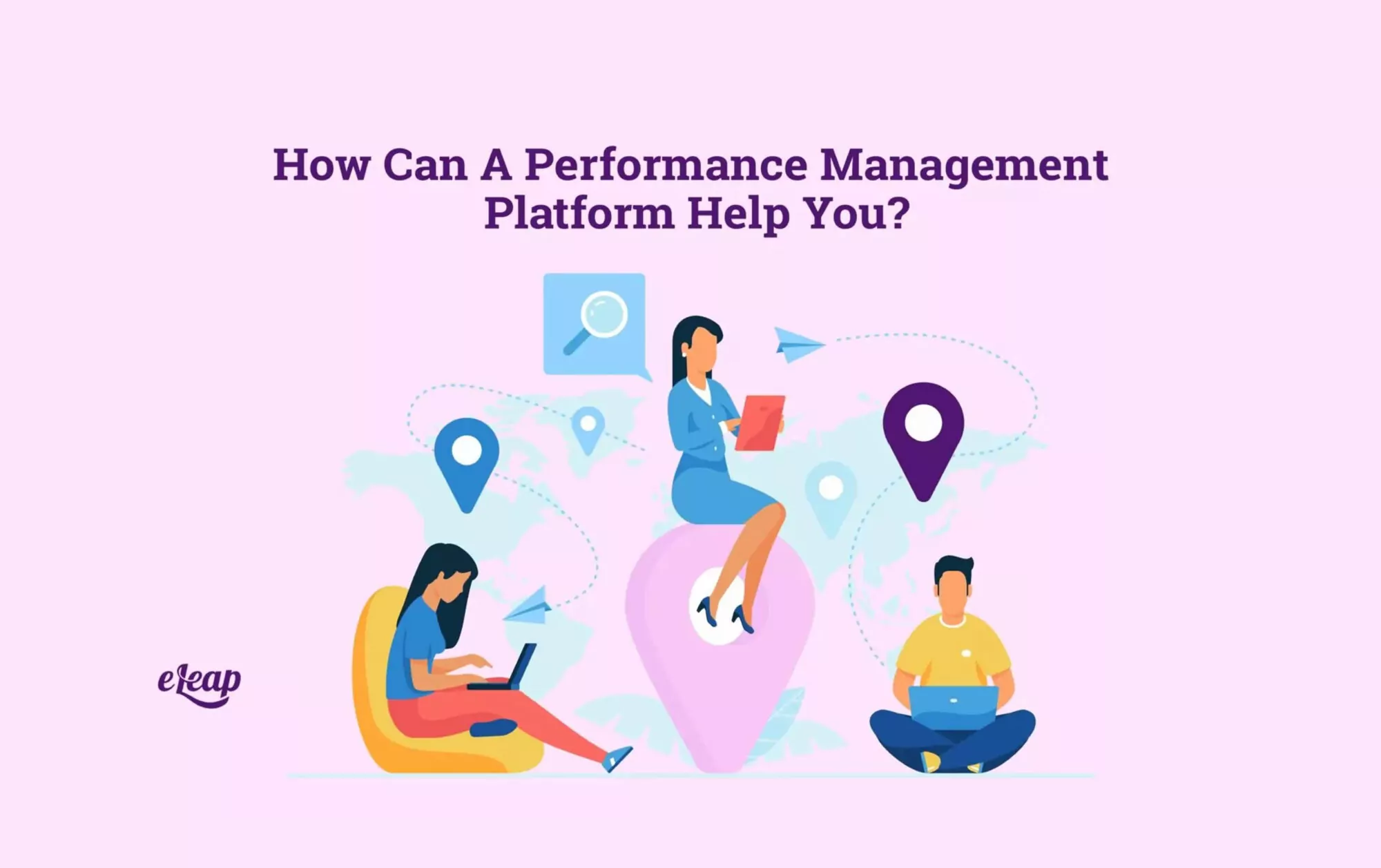How Can A Performance Management Platform Help You?

Human resources professionals and management teams that use a performance management platform can better monitor metrics like productivity and engagement. If you haven’t already begun using a performance management system, you may wonder if the systems are beneficial. Let’s look at what a performance management platform is and the goals, benefits, and features of this kind of product. Explore how eLeaP’s Performance Management Platform can simplify evaluations, boost productivity, and drive measurable results.
What Is A Performance Management Platform?
We live in a technological age. Whether you like it or not, many business systems are now software-based. While the options can be overwhelming, performance management platforms are becoming the norm across many industries. So, what exactly is a performance management platform?
Performance management software is a business platform that HR departments use to help spur productivity. Good performance management platforms replace the old annual performance review management and feedback model. The primary objective of these platforms is to ensure that employees and teams remain engaged and aligned with company objectives.
Annual reviews have been criticized for being too focused on the past. On the other hand, performance management platforms allow you to change individual goals and expectations as needed. They provide real-time goal setting, performance tracking, and feedback.
These software platforms are part of the talent management system software. Your HR department will oversee its use. They will also train managers and employees in the correct ways to use the software.

Goals of Performance Management Software
As a modern company, you need evolving goals and practices. Performance management platforms are replacing traditional performance review models. The programs provide real-time monitoring of performance metrics.
Many companies continually monitor performance while simultaneously providing support and feedback. Using a performance management platform allows you to track individual contributions to a team. It also allows you to manage the team’s ability to meet business goals. Monitoring your employees enables you to tie performance to your bottom line.
Another goal of performance management platforms is improving employee engagement. Employees can see their current performance goals and monitor their progress.
The platform can be used to track progress on specific projects. Managers compare employees’ performance to their goals, which gives employees a better understanding of their overall performance.
Benefits and Features of Performance Management Software
Performance management tools encourage routine communication between managers and employees. Managers benefit from using a performance management platform because there is no longer a need for a traditional annual review. However, the tools must be used continuously to be effective.
Another performance management platform feature is 360-degree feedback. This feature allows supervisors, peers, and subordinates to provide feedback in one centralized environment.
Using a performance management platform to track performance and goals has multiple benefits. Here are some of them.
Employees Can Track Their Own Progress
Employees can use the performance management platform to set work goals and track their progress toward those goals. The software is usually self-explanatory. Involving employees in the process helps them feel connected to the company. Employees become actively involved in decision-making, allowing them to feel valued.
The Team Receives Real-Time Feedback
One of the best benefits of performance management software is instant real-time feedback. The platform allows team members to communicate continuously. Continuous, real-time access will enable companies to facilitate engagement more efficiently, regardless of time and location.
Training employees on how to properly give feedback is a necessity. Often, using a performance management platform improves team collaboration and job satisfaction. However, it’s essential to foster a culture of positive feedback. Training should happen before the feedback feature is activated.
Management and Employees Can Manage Goals Effectively
Setting goals is the basis for an effective performance management platform. Using their performance management tools, companies can set employee goals and track their progress as they work toward meeting the goals. Therefore, managers can use the software to track the goals they set and prioritize based on employee abilities. Employees can also set their own goals according to company objectives, making them accountable for themselves.
Managers Have Easy Access to Reports
Performance management software generates a multitude of reports. Managers can access them easily. Managers can then strategize how to manage their employees best using the information. Employee analytics reveal the trends associated with employee performance, allowing management to formulate development and engagement initiatives.
Performance Management Platforms Incorporate 360-degree Feedback.
Companies now use 360-degree feedback more often. This form of feedback allows multiple people to participate in performance analysis. Employees can evaluate themselves or their peers. Customers, vendors, and mentors can include their comments. The tool gives employees a broader sense of their performance and their strengths.
Many companies use 360-degree feedback apart from a performance management system. However, investing in a performance management platform allows people to use 360-degree feedback for performance reviews. Employees can use the feature to leave anonymous feedback to managers. Moreover, employees can identify the gaps between their self-analysis and ratings from others.
Performance Management Software Provides Opportunities for Recognition
Giving feedback is only part of the benefit of performance management programs. Another benefit is the ability to provide recognition to employees. Those employees who complete tasks and meet deadlines to receive rewards and promotions get immediate acknowledgment of their efforts. The data regarding performance and feedback can be stored in the system and later referenced to provide written reviews.
Performance Management Platforms Provide A Scope for Professional Development
Career development benefits employees. Employees can choose which courses best fit their career plans. A performance management platform can match your employees’ career development needs with the employee and company goals.
Employers can set up various employee training opportunities using the reports from their performance management platform. Training can be designed to coach employees in the skills and networking they need to further their careers in their current company. Additionally, employers can choose to set up training based on the goals of individual employees so those employees feel supported by management.
Technology-Based Performance Management Is Future-Oriented
Constant performance management that is technology-based is futuristic. Many of these programs are edging toward making promotion and skills development more convenient. The programs rely on past data about employees and their performance.
A Performance Management Platform Allows for Purposeful Communication
Remember the traditional method for evaluating performance? Both the employer and the employee often end up frustrated. Performance management systems eliminate the portions of the process that cause problems when evaluating employees. Now, there’s no need for the paperwork required for employee evaluation.
Using the performance management platform for the evaluation process saves time, which leaves additional room for meaningful communication between employer and employee.
Use Performance Management Solutions to Foster Employee Engagement
Companies using performance management solutions find more rapid employee engagement. Employees have access to continuous feedback. Therefore, they feel more connected to the company. Greater connection leads to purposeful engagement that boosts self-worth.
Using performance management helps employers build trust among their employees. As trust builds, employees voice their needs and problems. Finding their voice empowers employees to initiate new business ideas. These behaviors help create a professional relationship between management and staff.
A Performance Management Platform Eliminates Perception Gaps
The conventional model of performance evaluation allowed prejudice fueled by perception. With a performance management platform, there is no room for perception gaps leading to those prejudices. The software consistently stores information, leaving little room for bias based on gaps in the employees’ perceived and actual performance.
Performance Management Platforms Assimilate Into Other Systems
The ideal performance management platform quickly benefits companies by integrating with their other systems. The systems combine large amounts of information to allow companies to make more informed talent acquisition choices. Combining performance-related technologies will enable companies to evaluate employee performance better.
Use Performance Management Solutions to Distribute Appraisals
A performance management system can remove the headache of creating and distributing performance appraisal notices. The performance management tool stores the relevant information regarding employee accomplishments. Because the information is stored within the software, employers are no longer burdened with remembering every achievement or need for improvement.
Final Thoughts
A performance management platform helps companies facilitate training, engagement, communication, and productivity. Companies that use performance management tools decrease the time spent on evaluations. The tools store information, so assessing how well employees perform is simpler.
Employees can self-assess by accessing their goals, progress, and reviews. Access to the reviews submitted by managers or peers helps eliminate the perception gap often present when evaluating performance. Using a performance management system leads to employee self-motivation. Additionally, employers find less need to micromanage because employees know their and the company’s goals.
The HR department oversees the implementation and use of the company’s performance management system. It’s a valuable tool for encouraging employee engagement and performance.